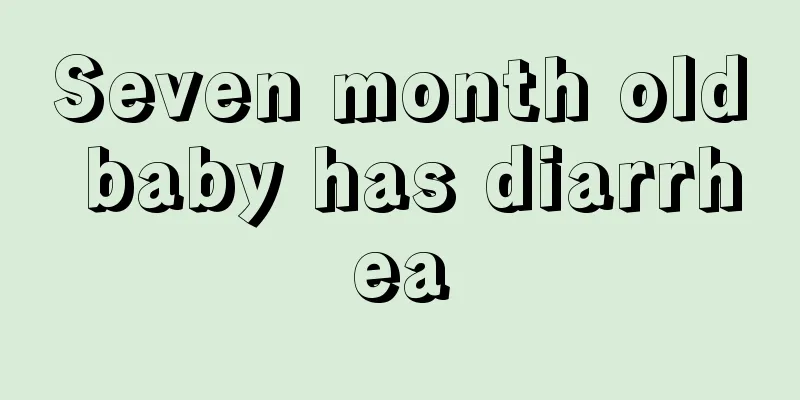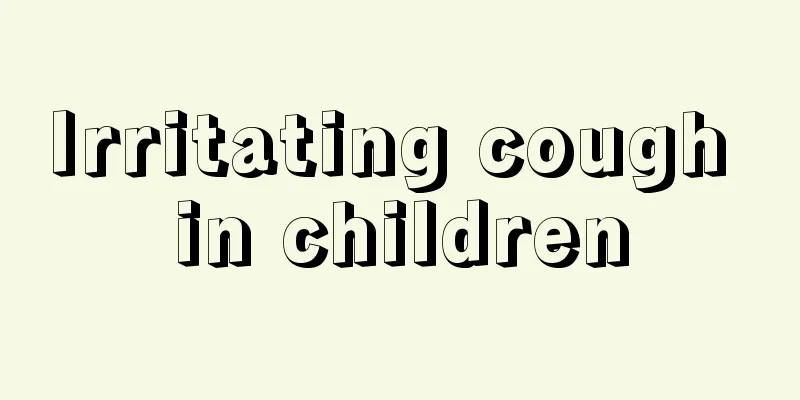Seven month old baby has diarrhea

|
It would be heartbreaking to hear that a seven-month-old baby has diarrhea, let alone if it is your own baby, it would be even more heartbreaking. A seven-month-old baby is still ignorant of the world and will just cry if he has diarrhea. Therefore, parents must stay calm and help their children solve the discomfort caused by diarrhea. If you feel that you cannot judge the condition, you must take your baby to see a doctor in time. A seven-month-old baby not only eats breast milk or formula, but also has added complementary foods, so the cause of diarrhea also needs to be considered from many aspects. It may be that the complementary food is not right, it may be an infection, or catching a cold, etc. Some mothers, when they are anxious, only know to give their babies antidiarrhea drugs. This is wrong. The baby is too young to use medicine casually. You need to consider the cause of the baby's diarrhea and then use medicine accordingly. There are two main reasons for baby diarrhea Non-infectious causes: Physiological diarrhea 1 When the nutritional content of breast milk exceeds the physiological needs and digestive function limits of children, diarrhea will occur. 2 Improper feeding can cause diarrhea, which mostly occurs in artificially fed babies. Diarrhea may occur after feeding due to irregular feeding times, excessive or insufficient amounts, or inappropriate food ingredients. 3 Sudden changes in climate and cold abdomen increase intestinal motility; overheated weather reduces the secretion of digestive juices. Thirst and excessive feeding increase the burden on the digestive tract, all of which can easily induce diarrhea. Infectious causes 1 Viral infection is mainly rotavirus: it is the most common pathogen of diarrhea in infants and young children in autumn and winter. 2 Bacterial infections are mainly caused by Escherichia coli and Shigella dysenteriae. Pathogenic microorganisms enter the digestive tract through contaminated food or water. The toxins of the pathogens cause digestive tract dysfunction and can cause diarrhea. This is more common in summer. What should you do after having diarrhea? First of all, you should take your baby's stool to the hospital and let the doctor know the cause of the diarrhea. There is infectious diarrhea and non-infectious diarrhea. The treatment principles of infectious diarrhea are different from those of non-infectious diarrhea. In addition, if your baby is infected with rotavirus, antibiotics are usually not needed for treatment. If you find a doctor, he will give you the correct treatment. Do not blindly add antibiotics without seeing a doctor. In other words, do not blindly use medication if the nature of the diarrhea is not determined. For example, rotavirus is a viral infection and antibiotics are ineffective, so there is no need to add antibiotics. If it is a rotavirus infection, hydration is the main treatment measure. Because there is currently no medicine that is completely effective against the virus, care is very important. At this time, he needs to be supplemented with water containing electrolytes. There are two channels. One is intravenous rehydration, that is, giving some sodium-containing and potassium-containing fluids to correct acidosis. You can also give him some glucose to supplement calories. On the other hand, if the child does not vomit under normal circumstances, he can be treated with oral rehydration salts. They are now sold in boxes, and the proportions inside are very reasonable. You can give him oral rehydration salts. Generally, if the dehydration is severe, he should drink a spoonful of water every 15 minutes. It contains electrolytes. He should still be fed with breast milk and formula milk on a daily basis. Starvation therapy is not recommended now. For example, the starvation therapy advocated in the 1960s was to stop feeding children with diarrhea and vomiting, and to starve them to give their gastrointestinal tract a rest. It is not recommended to feed him breast milk or formula milk while we are treating him. He can eat as much as he can, and he can still get some nutrition into his stomach, so we don't have to strictly fast him, and we can reduce the amount a little. If the diarrhea is caused by bacteria, and antibiotic treatment is required, it should be done under the guidance of a doctor. Choosing more sensitive antibiotics for the baby will have a better treatment effect. During the treatment, pay attention to giving water. In addition, prevent unclean food from being eaten again to cause reinfection. In other words, pay special attention to hygiene when eating, find those unhygienic links and eliminate them, so that the child will gradually recover. If the diarrhea is caused by allergies, it is best to change the baby's brand of milk powder with the doctor's consent. Many seven-month-old babies are still drinking breast milk. Mothers should pay attention that the food they eat can be absorbed by the baby through breast milk, so mothers should be very careful about their diet and try to eat food that is easy to digest, does not hurt the spleen and stomach, and is not irritating. This can indirectly protect the baby's stomach and reduce the baby's diarrhea. |
<<: Add complementary food to your child
>>: How to enhance your baby's immunity
Recommend
Babies' legs are different in thickness
Every parent is very worried that their baby will...
What foods can’t babies eat when they have diarrhea? It is important to learn to avoid certain foods
Adults have to learn to avoid certain foods when ...
What are the symptoms of food indigestion in children?
Because children's functions and organs are s...
What are the reasons for children's head sweating when sleeping?
As we all know, sweating mostly occurs in hot wea...
What is going on when a child picks his belly button?
Babies are not only very curious about the outsid...
What is the correct sleeping position for babies?
Many families now feel that raising children is a...
Children often complain of stomachache
Children will have many physical problems in thei...
Ringworm on children's head
Most children have a common problem: they like to...
How to treat children's autumn prickly heat?
Usually, skin diseases such as prickly heat are m...
What foods are good for the fetus?
Every expectant mother and father looks forward t...
What to do if your baby gets diarrhea after eating dragon fruit
The baby is still so young, and there are many fo...
What calcium supplements are good for a five-year-old child?
If you want to supplement your child's calciu...
What are the effective methods for treating athlete's foot in children?
Athlete's foot is not just a disease exclusiv...
What is childhood asthma
What is childhood asthma? I believe it is very ne...
Baby sneezes and has a runny nose in summer
Summer is a relatively hot season, and it is rela...









